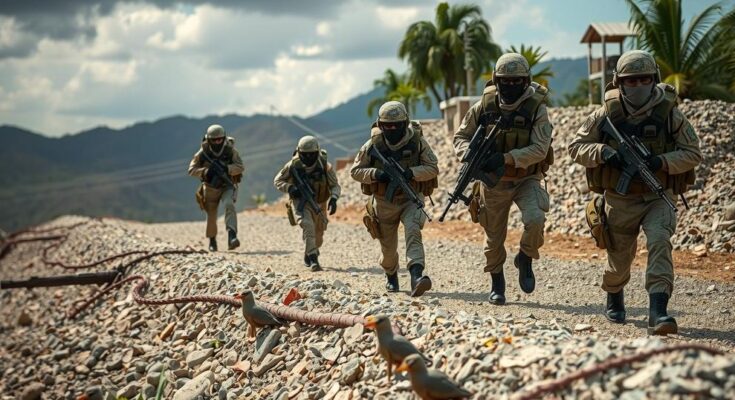Guatemala and El Salvador have deployed troops to Haiti to support the Multinational Security Support Mission amid claims of gang violence disrupting order. This military intervention is framed as vital for stability but overlooks the deep-rooted issues stemming from historical exploitation and colonial legacies. Haiti faces severe economic distress, with rising costs of living and environmental crises fueling local discontent and resistance to foreign dominance. As the situation evolves, the imperative for authentic democracy and the rights of the Haitian people remains paramount.
Recent military deployments by Guatemala and El Salvador to Haiti highlight the growing international military presence in the region, ostensibly to restore order amid escalating violence. This action follows a United Nations Security Council meeting that discussed amplifying the Multinational Security Support (MSS) Mission in Haiti, framed through narratives of “gang violence” which overlook historical and systemic issues affecting the nation. Historically, the plight of Haiti has been exacerbated by external interventions, a legacy dating back to its independence as the first free Black republic.
Since January 3, 2025, troop contributions from these Central American countries epitomize the renewed military commitment to a nation facing deep-rooted economic and political challenges, compounded by environmental disasters and rampant inflation of basic necessities. Despite the criticism of international military presence as neocolonialism, the Trinidadian transitional government has aligned itself with this support, further disconnecting from Haitian sovereignty.
Concern over Haiti’s deteriorating conditions is evident, as local prices for essentials have surged, rendering living conditions unbearable for many. Environmental crises such as floods have worsened the humanitarian situation, yet the current leadership has largely failed to address these pressing issues. The voices of resilience from the Haitian populace persist, with growing demands for authentic democracy and freedom from foreign occupation.
Formerly vocalized sentiments calling for a return to true democratic processes and self-determination echo the longstanding tradition of Haitian resistance, as encapsulated in the words of revolutionary leader Jean-Jacques Dessalines, who emphasized the need for comprehensive liberation.
The deployment of Guatemalan and Salvadoran troops to Haiti marks a significant moment in the ongoing humanitarian and political crisis facing the nation. This military intervention is justified by claims of deteriorating security due to gang violence. However, the reality is that these armed groups have emerged as a direct consequence of historical disenfranchisement and neglect stemming from both local governance failures and international exploitation. The push for additional troop presence coincides with an imperative for security that flouts the agency and rights of the Haitian people, framing foreign intervention as necessary when local solutions remain neglected. Compounding the issue, Haiti is suffering from acute economic distress, with skyrocketing prices for essential goods amid stagnant wages that leave many vulnerable to subsistence crises. The United Nations has pledged substantial support to create a semblance of order, yet this must be scrutinized against the context of Haiti’s long history of colonialism and neocolonialism.
In summary, the arrival of Guatemalan and Salvadoran troops in Haiti under the guise of supporting a multinational security mission raises critical concerns regarding foreign intervention’s implications for Haitian sovereignty and its historical context of exploitation. The exaggeration of gang violence as a primary narrative detracts from meaningful solutions that empower the Haitian people rather than impose external control. Amidst the ongoing struggles intertwined with economic hardship and environmental crises, Haitian voices continue to rise against oppression, advocating for genuine self-determination and a break from a cycle of occupation.
Original Source: www.liberationnews.org




